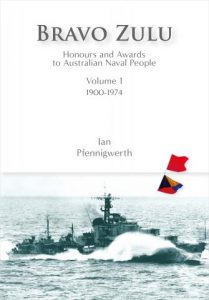- Author
- Book reviewer
- Subjects
- Book reviews, Naval Engagements, Operations and Capabilities
- Tags
-
- RAN Ships
- None noted.
- Publication
- December 2016 edition of the Naval Historical Review (all rights reserved)
By Ian Pfennigwerth. Echo Books, Geelong, 2016. Hardcover & Paperback with illustrations, maps and index, 775 pages. RRP from $65. Available through Echo Books at www.echobooks.com.auor from Ian Pfennigwerth at www.nautilushistory.com.au

Some retired officers invite visitors to take a book from their libraries as a memento and to reduce the estate their family will need to disperse. But if I embrace this custom, Ian Pfennigwerth’s magisterial Bravo Zulu: Honours and Awards to Australian Naval People, Volume 1: 1900 -1974 will be hidden from view. I intend to keep this volume because it will frequently come in handy and is a delight to read. The two letters in the title – Bravo and Zulu – mean ‘Well Done’ in naval parlance, and Volume 1 is quite literally a brick of a book as will be the second volume (1975 -2014).
This is not a traditional reference book with names and citations reproduced alongside a commentary on the origins and criteria of an award. It tells the story of the Colonial Naval Forces, the Commonwealth Naval Forces and the Royal Australian Navy (RAN) and weaves the honours and awards received by Australian naval personnel from Australian and Allied governments into a fast flowing narrative. Its inclusion of honours and awards received in peacetime and civilian bravery awards is most welcome. A good deal of the RAN’s success in combat operations resulted from energetic and enlightened peacetime service among unheralded officers and sailors.
When the research for this volume commenced in 2009, Ian Pfennigwerth and his research partner David Ruffin did not imagine the task would be so difficult or demanding. But, as Ian explains, he relied on hundreds of people to open doors and archives, to provide introductions and insights, and to make connections between places, people and events that defied quick and easy explanation.
In the first chapter the Imperial (British) honours and awards systems, the significance of certain orders and particular decorations, how an individual was recommended and the process by which they eventually received it are explained. I learned a great deal from this chapter including the lament that Australian personnel received fewer honours and awards than their Royal Navy counterparts, a fact that was ‘the subject of much adverse comment’ in the 1930s.
Subsequent chapters are arranged chronologically, the second covering the period to 1939, which was marked by upheaval and uncertainty. Transitioning from a tired colonial flotilla to a battle-ready fleet, Australian naval personnel distinguished themselves in ways that I had not previously known. Their creativity in developing new tactics and their courage in imperilling their own lives to save others in need are simply inspiring. Chapter Three details the honours and awards system operating between 1939 and 1974, when Australian honours replaced Imperial awards.
The next four chapters cover the Second World War. Given the duration of the conflict and the number of personnel in naval uniform (nearly 40,000), these represent the bulk of the narrative, sensibly told by theatre. This arrangement provides coherence for the operations of individual RAN, often lost when they are tracked and assessed separately. I was struck by the inconsistencies in recognising wartime service, with some service in some ships in some situations more likely to be recommended. Approving authorities could not be objective when relying on written accounts rather than eye–witness testimonies, but many deserving acts went either unnoticed or were inadequately recognised. Recipients were usually surprised and always delighted with their honour or award while the empty-handed simply went on with their duties.
Chapter Nine – ‘Testing Times, 1946 to 1965’ – coincides with my area of personal and professional interest. The serious decline of the RAN in the late 1950s, and a series of accidents climaxing with the 1964 Melbourne–Voyager collision, suggested to the parliament and the press that the Navy’s professional standards were deteriorating. This was countered by the RAN’s highly effective performance in complex naval operations in Vietnamese waters and the Mekong Delta, in the air and along the Vietnamese coast. While very ably depicting the RAN’s involvement in the Indonesian ‘Confrontation’, Bravo Zulu also describes vital pioneering work in signals technology, weapons engineering, personnel management and command organisation. The Navy struggled with obsolete equipment and acquiring modern replacements, but its people used ingenuity and their refusal to concede defeat to nurse the RAN through what Ian Pfennigwerth rightly calls ‘testing times’. The final three chapters cover the Korean War, the Vietnam conflict and the ‘End of Forward Defence 1966-74’.
I decided to avoid naming any individual recipient in Bravo Zulu’s 2075 individual stories but, I want to mention seven-year-old Jennifer Purtell, presented with her father’s Distinguished Service Medal in 1943 after he had died in action in HMAS Parramatta. The picture of the presentation is incredibly moving. She could not have understood why the war was necessary or why her father had been taken from her, but I hope the medal and what it signified brought her some comfort and consolation.
Bravo Zulu is a terrific book that every library in Australia should acquire as a reference text. It is a personalised history of the RAN and an invaluable compendium for students and scholars chasing an elusive fact or form of words to detail an action or to describe a person. Echo Books is to be warmly commended on a first-class, handsome volume. In sum, the naval historical community owes a great debt of thanks to Ian Pfennigwerth and his team, a debt that will be enlarged as we eagerly await the appearance of Volume 2.
Reviewed by Tom Frame
